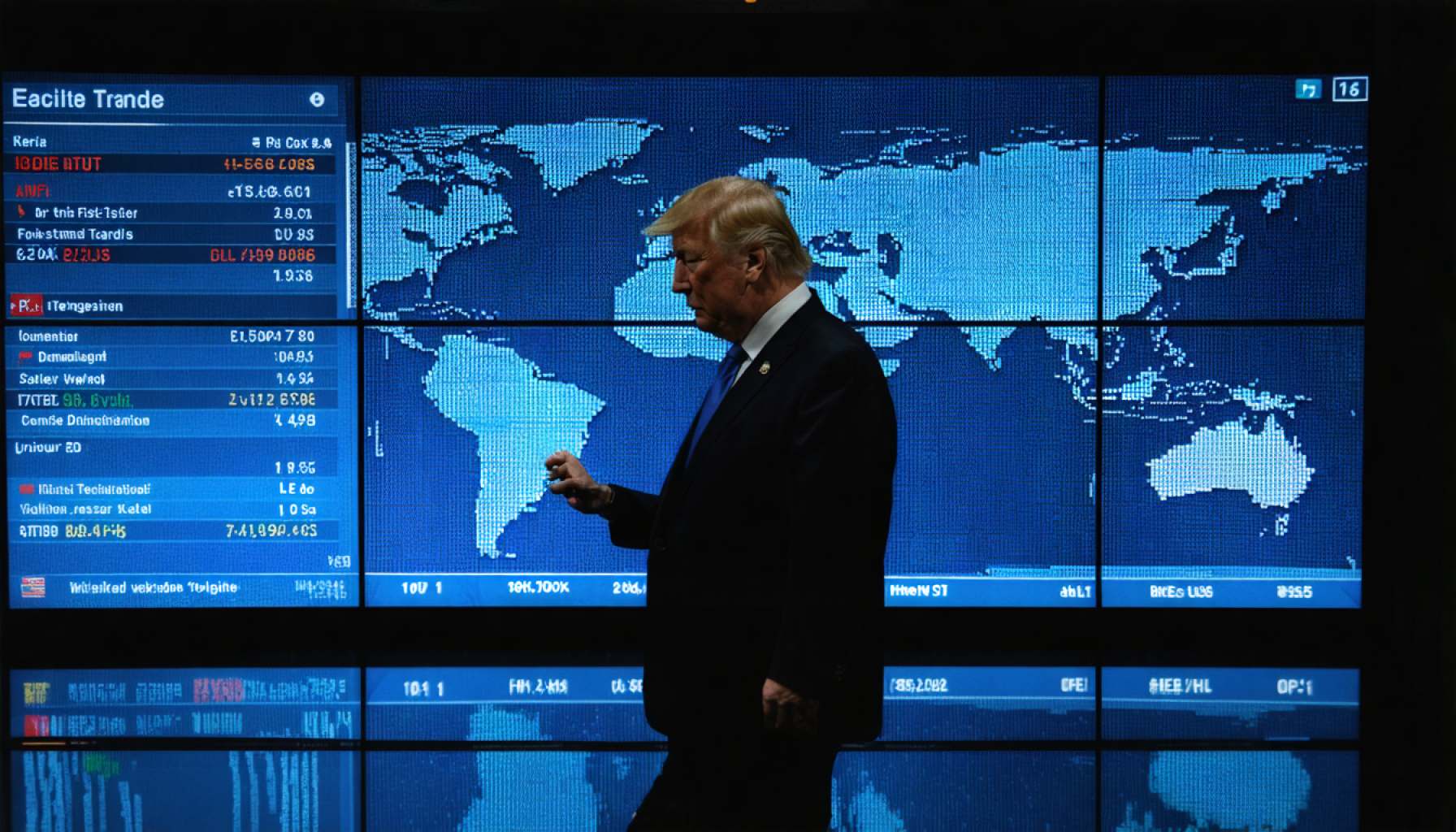- Technology stocks face intense pressure amid fears of a global trade conflict, with major companies like Tesla, Nvidia, and Apple suffering significant declines.
- China’s retaliatory tariffs have heavily impacted the US tech sector, with Tesla and Nvidia stock dropping over 9% and 7%, respectively.
- Apple experiences its sharpest decline in five years, with a 5% drop in response to tariff concerns affecting its production strategy.
- Semiconductor stocks are hit hard, as the VanEck Semiconductor Index falls 7%, affecting companies such as Marvell Technology and Micron Technology.
- The broader tech sector, including Amazon, Alphabet, and Microsoft, sees a unified decline, reflecting the vulnerability of the market.
- The Nasdaq Composite is on track for its worst week since the early days of the 2020 pandemic, highlighting the volatility and interconnectedness of global markets.
Steel-colored clouds gathered above Wall Street as technology stocks braced for another stormy session, encapsulating the growing dread of a global trade conflict. A chorus of economic alarms resounded louder on Friday as key players like Tesla and Nvidia stumbled, sending ripples across the tech sector. These titans of innovation found themselves caught in the crossfire of geopolitical sparring, sinking over 9% and 7%, respectively, as investors watched with bated breath.
This plunge follows a Thursday bloodbath, ignited by China’s retaliatory tariffs — a strategy reminiscent of a chess game’s decisive counterattack. The tariffs, targeting the US with surgical precision, have set the stage for a potential global economic showdown, one that could test the resilience of even the most robust corporate giants. Meta’s stock saw a 4% dip, a forewarning glimmer of the volatility yet to come. Meanwhile, the titans of tech—Amazon, Alphabet, and Microsoft—faced a unified decline of over 1%, reflecting the broader sector’s vulnerability.
Amidst this chaos emerged one stark truth: the venerable Apple recorded its sharpest slump in half a decade, 5% lower, signaling a deeper unease. As new tariffs threaten its production pivot outside China, investor confidence wanes, driving Apple’s week-long plummet to over 11%.
The shadows deepened over semiconductor stocks as well. Though nominally spared by the latest tariff rounds, their reliance on overseas production painted a target too tempting to resist. The famed VanEck Semiconductor Index nosedived 7%, and companies like Marvell Technology and Micron Technology were caught in the downdraft, descending by double digits and shaking the sector’s foundations.
Amidst these declines, the underlying music remains the same: a crescendo of fear that the global tit-for-tat tariffs could spiral into a full-blown recession. As the market reels, the decline of the Nasdaq Composite foreshadows its worst week since the early pandemic days of 2020. It’s a stark reminder that in these turbulent times, technology’s indomitable rise might face uncompromising resistance.
The current market turmoil sends a clarion call—one cannot disregard the interconnected nature of today’s global economy. While storms on one side of the globe can unleash tempests on Wall Street, adaptation and strategic patience may well become tech’s counter-move. The narrative unfolding is a blend of cautionary tale and awakening call to brace for what might mark a new chapter in economic history.
Will The Storm Over Wall Street Shake Up Your Tech Investments? Find Out Now!
In-Depth Analysis of the Global Trade Conflict and Its Impact on Tech Stocks
The growing unease over a potential global trade conflict is reshaping how investors view technology stocks, particularly giants like Tesla, Nvidia, and Apple. As these companies face downturns due to geopolitical tensions, it’s essential to understand the broader implications, assess the risks, and strategically reposition your portfolio to weather the storm.
Industry Trends and Market Forecasts
1. Geopolitical Tensions and Tech Stocks: The latest tariffs introduced by China have significantly impacted American technology stocks, as seen in Tesla and Nvidia’s recent declines of over 9% and 7% respectively. This reflects a larger picture of volatility across the tech sector, particularly as these companies have established a substantial portion of their production and customer base overseas. For investors, this emphasizes the importance of geographic diversification in their investments.
2. Apple’s Slump: Apple’s 5% loss is a significant red flag for investors, signalling concerns over the company’s production adjustments outside China. As tariffs continue to play a critical role, Apple may need to rethink its supply chain strategies to mitigate further risks.
3. Semiconductor Sector Hit: Despite not being directly targeted by the recent tariffs, semiconductor stocks are suffering due to their reliance on foreign supply chains. Marvell Technology and Micron Technology’s declines highlight the vulnerability of this sector to external economic pressures.
How to Navigate the Volatile Market
1. Diversification: Ensure your investments are spread across various industries and geographies. This strategy offers a buffer against sector-specific downturns, such as those currently affecting the tech industry.
2. Stay Informed: Keep abreast of geopolitical developments and trade policy changes, as these can have immediate and substantial impacts on stock prices.
3. Long-term Perspective: While short-term volatility can be nerve-wracking, maintaining a focus on long-term growth potential can prevent hasty decision-making.
Real-World Use Cases: Impact of Tariffs on Supply Chain
– Tech Manufacturing Shifts: Companies may increasingly move their manufacturing bases away from China, sparking significant shifts in global supply chains. This could mean new opportunities for countries offering viable alternatives with lower production costs.
– Consumer Product Pricing: Tariffs may lead to increased production costs, which could be passed down to consumers, affecting demand for tech products.
Security & Sustainability
As the tech sector faces increasing scrutiny over its environmental impact, crises such as the current trade conflict also pose questions about sustainability:
– Resource Allocation: Sustainable supply chains are becoming critical as companies like Apple and Microsoft face potential material shortages. This might lead to higher investments in recycling and renewable resources.
– Compliance and Regulations: Adhering to international environmental standards might become more stringent in response to geopolitical tensions, introducing further operational costs but offering opportunities for innovation and differentiation.
Recommendations
– Stock Alerts: Set up alerts for your investments to remain updated on fluctuations, especially for those strongly impacted by geopolitical events.
– Risk Assessment: Regularly assess the risk profile of your investments in tech, and consider adjusting your allocation based on emerging market trends and forecasts.
– Monitor Earnings Reports: Closely follow the quarterly earnings reports of impacted tech firms like Nvidia and Apple’s to assess their recovery strategies and financial health.
By understanding these dynamics and following these strategies, investors can better position themselves to thrive despite market turbulence. Stay resilient, informed, and adaptable in these uncertain times.
Related Links for Further Reading:
– New York Times
– The Wall Street Journal
As the global economy continues to shift, staying informed and flexible in your investment approach is vital to weathering the current storm and emerging stronger on the other side.










